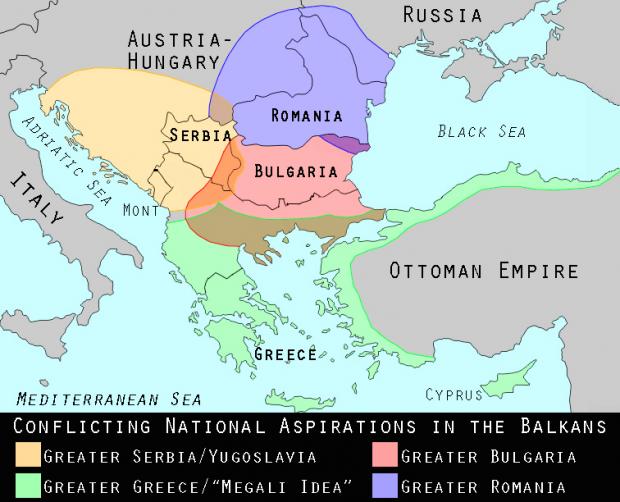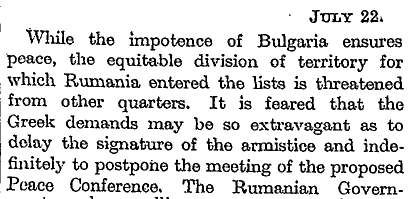I do not claim to be an expert on the Balkan Wars which were fought in 1912 and 1913. If I understand correctly, in the First Balkan War Turkey was almost completely thrown out of Europe while in the second Bulgaria embarked upon a war of conquest and ended up with rather less than she’d started with.
The significance of all this, as Eric Sass points out, lay in how it altered Russia’s relationship with Serbia. Russia, Serbia and Bulgaria were Slavic states. Russia, being the biggest, wanted to be the leader. Serbia and Bulgaria, being small wanted Russian protection. So, when a dispute rose over the borders between them the two small states submitted their dispute to the big one. When Bulgaria failed to get what she wanted she went to war.
Defeat led to Bulgaria allying herself with Austria-Hungary while Russia responded by allying herself ever more closely with Serbia. Hence, perhaps, the robustness of Russia’s response to Austria’s declaration of war against Serbia in 1914.

Update For a while now I’ve been in the habit of linking to the whole page rather than just the article. This has been to give readers the chance to see what else was making the news at the time and, perhaps, to find something just as bloggable. Well, it appears Simon Gibbs has done just that.





And a dispute over some stony orchards, populated by peoples with nice yoghurt and plum brandy, speaking similar languages in the same alphabet laid the ground for WW1, 2 and the Cold War, and hundreds of millions of deaths under war and socialisms.
The sheer idiocy of government, written in blood.
I think it’s only fair to point out that similar disputes in the 1990s did not lead to a world war.
Indeed, the very ending of the Cold War unfroze the tensions, as world war lost its ‘appeal’. The underlying assumption appears to be that land and/or people belong to governments, regardless of the wishes of the inhabitants.
Not many people know about the attempted reconquest of Constantinople by the Greeks.
One of the more neglected “what ifs” of historical fiction…
http://en.wikipedia.org/wiki/Greco-Turkish_War_(1919%E2%80%9322)
A fascist Greek government at the soft underbelly of Russia???…
@Mr. Ed
Horrific wars do tend to decrease the ‘appeal’ of war. Especially as the 2 big ones pounded home the idea that the instigators of such are most unlikely to be able to enjoy the benefits of the ‘glorious future’ on which they based the idea of going to war.
And the underlying assumption has been the underlying assumption of “leaders”, if not governments, since long before the Treaties of Westphalia provided a “legal” framework for governments to ignore what the other guy does to his inhabitants, since he will ignore what we do to ours.
Until at least 1991, Soviet Russia proclaimed ‘ownership’ of any and all persons born in Russia (Imperial or Soviet) as “citizens” even though many had never submitted to Soviet power. (See ‘Victims of Yalta’ by Nikolai Tolstoy for example).
I really can’t think of a better oxymoron than “Greater Bulgaria”.
I think the coup in Serbia in 1903 (replacing the pro Austrian dynasty with a pro Russian one) is important – and it was real Prisoner of Zenda stuff
Accept there was no Rudolf R. to save the day – just a weak king, an “unsuitable” marriage, and ruthless enemies (led by the same butcher who organised murder of the Archduke Franz Ferdinand in 1914.
As for Bulgaria – the desire for a “Big Bulgaria” had been a staple of Russian policy since at least 1878 (frustrated by Dizzy at the Congress of Berlin).
Bulgaria had a strongly pro Russian population (culturally – and because of age old hatred of the Ottoman Turks)) – but everyone else tried to make sure that the government of Bulgaria would not be pro Russian.
veryretired:
While I fully agree with you how ridiculous and hilariously parochial it sounds, hailing originally from Bulgaria, I can shed some light on the history and demo-psychology of the term. It goes back, funnily, over a thousand years back to King Simeon I. His father Boris had christianized Bulgaria, and under Simeon Bulgaria bordered the Black, Aegean, and Adriatic seas, effectively controlling all of the Balkan peninsula. The claim has been made (perhaps wildly exaggerated – Paul Marks can help) that at that time Bulgaria (having defeated and temporarily marginalized the Byzantines) and the Holy Roman Empire were on equal footing as the dominant powers in Europe. Like the Holy Roman Empire, Bulgaria soon fractured on into competing “despotships”, but unlike the Holy Roman Empire, it happened to be on the crossroads between Europe and Asia, and such fracturing proved fatal when first the Tatars, and then the Turks came around. Hence, the second claim made (isn’t counter-factual history fun?!) is that had Bulgaria stayed unified – that’s not how social evolution works, but people like to believe what they like – it would not have been set back by 200 years of Tatar domination and 500 years of Osman Turk domination, and would have been the leading power in Europe today.
So, yes, “Greater Bulgaria” is a ridiculous concept, but it is based on at least some quasi-historicity, as most similar claims are – you’ll even hear about “Greater Albania” in Albania. Government propaganda is as old as government, and in Bulgaria in particular people were (probably still are) indoctrinated from a young age to believe that if it had not been for bad luck and a couple of incompetent rulers following Simeon they could have been “somebody”, and even “the man”, nowadays.
Plamus, thank you or the informative response. Once again I am reminded that there is an entire universe out there I know very little about.
In a similar vein to your story, my grandmother, whose family was from Bohemia, from which they fled after some sort of civic turmoil in the middle 1800’s, always referred to herself as an Austrian.
My mother told me after she died that gramma thought being an Austrian was more dignified and socially respectable than being a Bohemian, and since Bohemia was part of the Austrian Empire prior to WW1, she used that designation.
Such little things help remind me that I am directly connected to 2 past centuries, and inspire me to pass those connections on to the 2 newer generations coming along behind me.
One of the great dangers of the modern age, I remember reading and hearing about endlessly as I went through school, was that our soulless commercial culture separated us and atomized us, cutting us off from the community of a mutually shared civilization.
I was always baffled by this idea, as I never felt any of the alienation that was supposed to be running rampant all through our society, and didn’t notice much of it in my friends either.
Whenever we sat down for a holiday dinner, or even just on an ordinary Sunday, I was surrounded and suffused with the spirits of generations past, from the grace we said to the special tablecloth and dishes we used, to the fabulous dishes that my gramma put in front of us, just as she had learned from her mother and grandmother in a weave of knowledge and experience that reached back to the days of Napoleon.
From such a simple tapestry is cultural history created, and one’s place in it comfortably situated, like a familiar old chair in which to read a good book on a snowy afternoon.
An impetus for desiring or talking of a “Greater ” often comes if a country considers itself to share language or ethnicity with people living outside its borders, or there are places with which it feels a strong cultural affinity which it may or may not have ruled at some time in the past. Alas, the distribution of populations and the history of the Balkans leads to a lot of such dreams. In the case of the Greater Albania, well there are a lot of Albanians outside the borders of Albania. Most notably, I suspect this is code for wanting unification with Kosovo, but there are a great many Albanians in Macedonia, and a few in Greece, too.
The present Republic of Macedonia is a strange one. Geographically it has formed part of dreams of Greater Greece, Greater Bulgaria, Greater Albania, and managed to be part of a Serb dominated Yugoslavia for most of the 20th century. If you go to Skopje now (as I did the day before yesterday) you discover that the Macedonians have spent the last few years building strange, grandiose public buildings in every imaginable architectural style (as long as it grandiose) and erecting statues of everyone to whom they can find some connection (with Alexander the Great foremost, although the national connection to him seems somewhat tenuous) in a clearly very expensive attempt to assert a national identity of some kind. It’s a muddled, confused Disneyland of an assertion, but it sure is worth seeing.